Heavy-duty stun batons have emerged as essential non-lethal weapons in global security operations, providing professionals with a powerful tool to manage high-risk situations and minimize casualties. These tools disrupt motor functions or induce temporary pain, effectively de-escalating tensions. Their versatility and robust construction make them valuable in diverse settings, from indoor to outdoor environments. Certification programs ensure users are skilled and responsible in deploying these weapons while adhering to legal boundaries, making heavy-duty stun batons a crucial asset for modern security practices that prioritize public safety without excessive force.
“In today’s diverse security landscape, understanding non-lethal weapons is crucial. This comprehensive guide delves into the world of heavy-duty stun batons—a versatile tool in modern security operations. We explore their role, from crowd control to personal protection. The article navigates the certification process, revealing the expertise needed to handle these devices effectively. Additionally, we dissect the benefits, legal considerations, and ethical applications of heavy-duty stun batons for enhanced security in various sectors.”
- Understanding Non-Lethal Weapons: A Comprehensive Overview
- The Role of Heavy-Duty Stun Batons in Security Operations
- Certification Process: Unlocking the Expertise in Non-Lethal Weaponry
- Benefits and Applications: Enhancing Security with Stun Batons
- Legal Considerations and Ethical Use in Modern Security Practices
Understanding Non-Lethal Weapons: A Comprehensive Overview
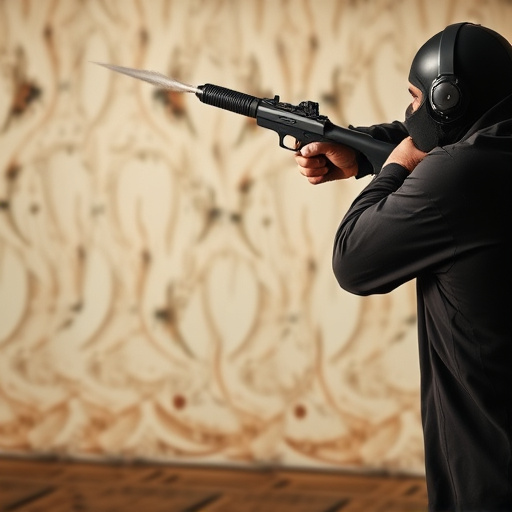
Non-lethal weapons, also known as less-than-lethal or non-deadly force options, are designed to incapacitate or control individuals without causing permanent harm or death. These tools have gained significant importance in law enforcement, security, and military operations worldwide due to their ability to manage high-risk situations while minimising casualties. In the context of security, heavy-duty stun batons are a popular choice for professionals dealing with potential threats and disturbances. They offer a powerful yet non-lethal means of self-defence and crowd control.
A comprehensive understanding of non-lethal weapons involves recognising their diverse range, including stun guns, pepper spray, tasers, and physical tools like batons. Each type employs different mechanisms to disrupt an individual’s motor functions or cause temporary pain, thereby enabling authorities to gain control and de-escalate tensions. With the ever-evolving nature of security threats, staying certified in non-lethal weapon training ensures professionals are equipped to handle a variety of scenarios effectively, making them valuable assets in any security operation.
The Role of Heavy-Duty Stun Batons in Security Operations
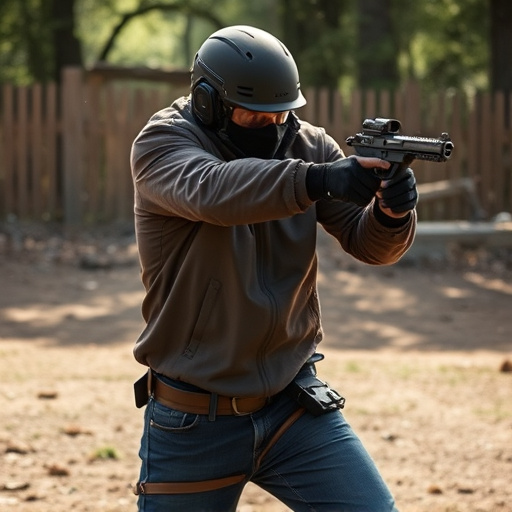
In the realm of security operations, heavy-duty stun batons have emerged as a game-changer, providing non-lethal force options for professionals. These specialized tools are designed to incapacitate individuals temporarily through electric shock, thereby de-escalating potentially dangerous situations without causing permanent harm. With the increasing emphasis on public safety and the need for less lethal force alternatives, stun batons have become an indispensable asset for security personnel.
For security operations, heavy-duty stun batons offer several advantages. Their robust construction ensures durability and reliability in various environments, making them versatile tools for indoor and outdoor security measures. The high voltage output delivers a powerful shock, enabling officers to control and subdue aggressors effectively while minimizing the risk of serious injury. Moreover, proper training in using these devices, often part of non-lethal weapon training certification programs, equips security professionals with crucial skills to handle challenging scenarios safely and efficiently.
Certification Process: Unlocking the Expertise in Non-Lethal Weaponry
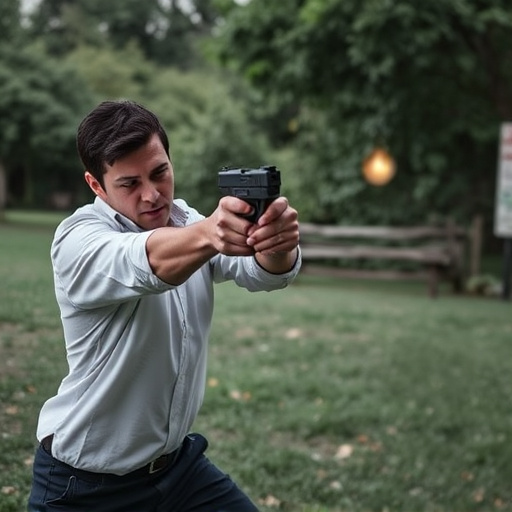
Obtaining a non-lethal weapon training certification is a multifaceted process designed to equip individuals with the expertise needed to handle heavy-duty stun batons for security purposes effectively and responsibly. It begins with rigorous training that covers various aspects of non-lethal weaponry, including practical demonstrations, tactical applications, and legal considerations. Participants must master not only the physical use of stun batons but also understand their limitations and potential risks to ensure safe deployment.
The certification process involves written examinations and hands-on evaluations to assess competency. Aspiring security professionals must demonstrate proficiency in identifying suitable non-lethal options for different scenarios, understanding de-escalation techniques, and applying proper force while adhering to legal guidelines. Successful completion of this rigorous program not only grants access to specialized tools like heavy-duty stun batons but also fosters a culture of responsible and effective law enforcement or security practices.
Benefits and Applications: Enhancing Security with Stun Batons
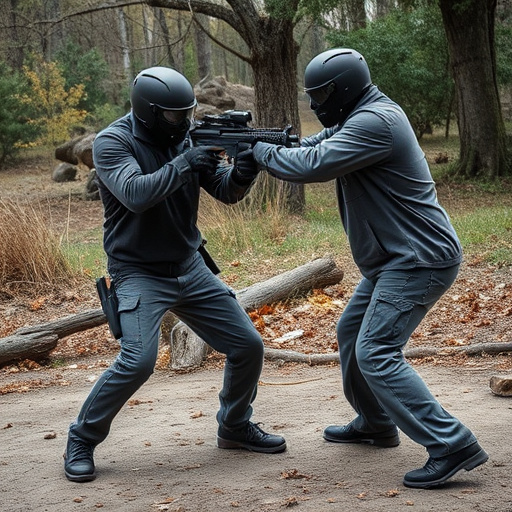
In today’s world, where security concerns are paramount, heavy-duty stun batons have emerged as a valuable tool for enhancing safety measures. These devices offer a non-lethal approach to self-defense and crowd control, making them indispensable for various professionals. From security guards and law enforcement officers to private investigators and even individuals seeking personal protection, the benefits of stun baton training are numerous.
Stun batons provide an effective deterrent against potential threats, allowing users to incapacitate an attacker temporarily without causing permanent harm. Their robust design ensures they can withstand rigorous use, making them reliable tools for securing high-risk areas. With proper certification and training in handling heavy-duty stun batons, professionals can confidently navigate challenging situations, ensuring the safety of themselves and those under their protection.
Legal Considerations and Ethical Use in Modern Security Practices
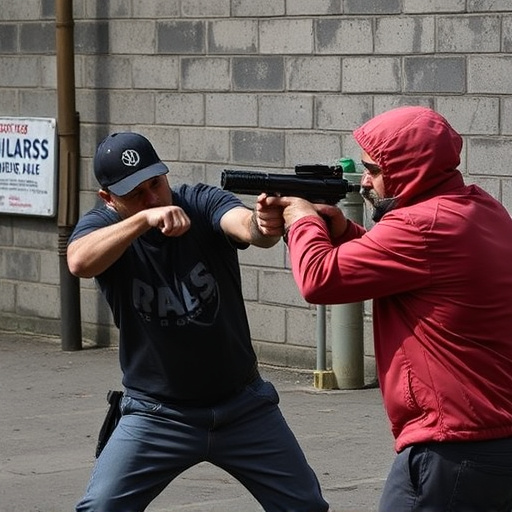
In the realm of modern security practices, the ethical and legal use of non-lethal weapons is a critical aspect that cannot be overlooked. As the need for enhanced security measures continues to grow, particularly in public spaces and private properties, the adoption of alternative force options becomes increasingly prevalent. One such tool gaining traction among security professionals are heavy-duty stun batons—a non-lethal solution designed to incapacitate individuals without causing permanent harm.
The certification process for handling these devices plays a pivotal role in ensuring their responsible deployment. Training programs equip security personnel with the knowledge and skills necessary to navigate complex situations, balancing public safety with the ethical use of force. Legal considerations surrounding stun batons vary across jurisdictions, necessitating professionals to stay abreast of local regulations. Proper training ensures that security guards can make split-second decisions while adhering to legal boundaries, thereby fostering a secure environment without resorting to excessive or unnecessary force.
The certification process for non-lethal weapon training equips professionals with the skills to deploy heavy-duty stun batons effectively, enhancing security measures. Understanding these tools’ unique applications and legal framework ensures responsible use in modern security practices. By embracing certification, security operations can maximize the benefits of stun batons, contributing to safer environments without resorting to lethal force.
